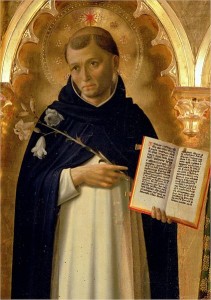St. Dominic’s Insight and Evangelization Today
Insights from Conversing with an Innkeeper
Dominic Guzmán (1170-1221), a Spanish priest traveling with his bishop in southern France, spent an entire night talking with an innkeeper who was a believer in Catharism, a dualistic religious cult that originated in the East. He discovered that the man had not really rejected Catholic teachings but rather was ignorant of them. This discovery led to the founding of the Order of Preachers (the Dominicans), a group dedicated to learning theology and other disciplines and communicating the beliefs of the Church to all they met, while living as beggars and travelers on the highways and byways of Europe. Many great theologians and prophets, both men and women, have served the church through the centuries as followers of Dominic and his early companions.
Moving into a Changing World
Dominic’s insight that the Gospel must be taught both with words and through the lives of the ones proclaiming it in the contemporary world with all of its challenges holds as true today as it did some eight hundred years ago. In many ways, we as a community of faith had, until recently, settled into an almost self-satisfied attitude that all of the answers to the questions of faith and moral behavior had been resolved by theologians of the Middle Ages and/or at the Council of Trent. As Tevye (of “Fiddler on the Roof”) might have expressed it, “Everyone knows who he is and what God expects him to be!”
Yet such an attitude of self-confident satisfaction with who we are and what we believed did not serve us well. The world’s people continued to discover new truths in science and new understandings of human behaviors and cultures. Industrialization brought changes in family life and opportunities. Education of both boys and girls has become a given in Western societies and increasingly this is also the case in non-industrial societies around the world as well. More strikingly, perhaps, we did not as intelligent inhabitants of this planet learn how to live together in peace, with the common good as our highest concern. Instead, we set about conquering each other, with the nations having the strongest military plundering the regions they had conquered. Somehow the old teachings no longer answered the new questions about God, life, and the reality of evil in the world.
Evangelization Today
Pope Francis and his recent predecessors have called the Church to a new focus on evangelization. The teachings of the Church, including new insights from theology, philosophy, anthropology, psychology and other disciplines, must be presented to the world and lived out joyfully by Christian believers. Pope Francis repeatedly stresses the importance of going out into our communities and meeting people where they live and work. We are to work to alleviate poverty and suffering. We are to serve without judging others whose lives and values differ from ours. We are to be true to the traditions of our community, but recognize that those traditions may need to be presented in different words and explained using different images. Some of those traditions may need to be stretched so they express the lived experience of a new generation of believers. This is the age of the Holy Spirit in salvation history and we must recognize that God is so much bigger and more amazingly wonderful than we could ever imagine, that no human formulation could ever totally express the full reality of who God is.
Like the times of Dominic Guzmán, there is a great need in today’s world for people of faith to learn about God, about our Christian beliefs and traditions, and about the newly emerging insights of our living faith community. The days when the catechism lessons of childhood sufficed for an adult life of faith are long since gone, if they ever truly existed. We are all called to continue to learn, to study Scripture, to reflect on God’s active presence in our lives, and to share what we have learned with others. And we do this not just at Church or in catechism classes, but also in our daily activities on the highways and byways of our lives. The People of God are once again called to be proclaimers of the loving presence and activity of our God.
And that innkeeper with whom Dominic spoke all night? He returned to the Catholic faith once he understood what the community really believed.
St. Dominic, Pray for us!
Image: St. Dominic by Fra Angelico, Side panel of the Altarpiece in Perugia











